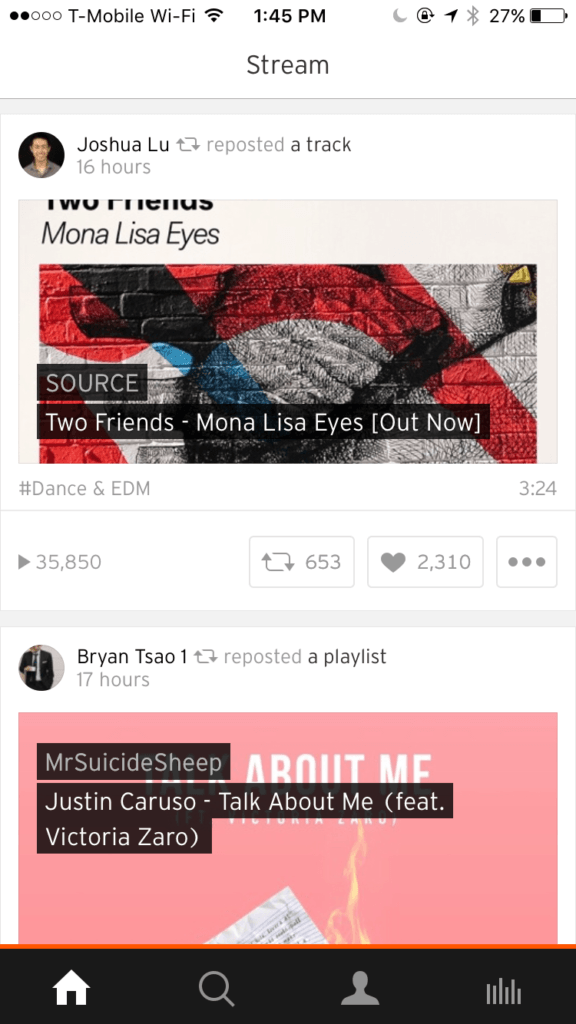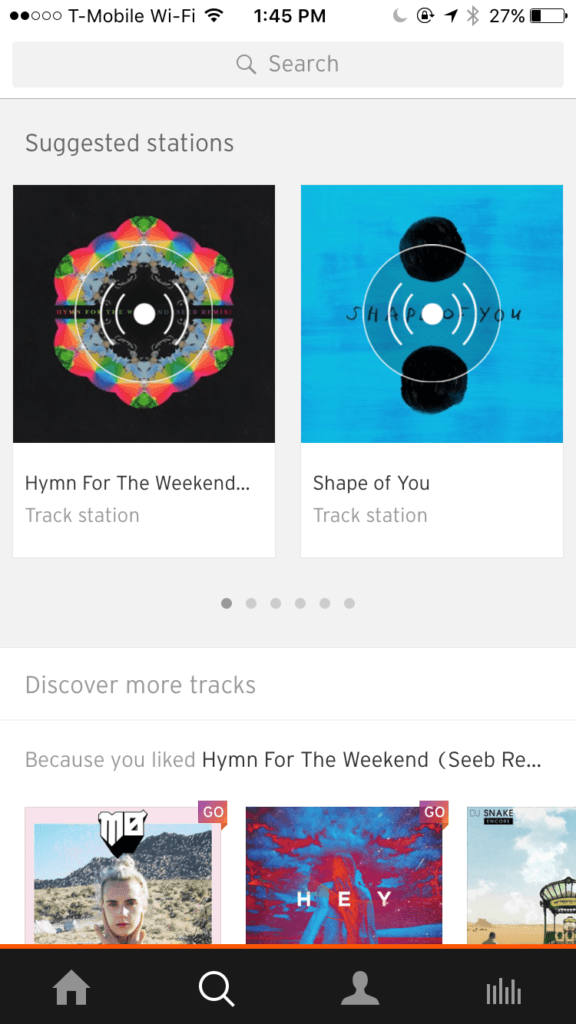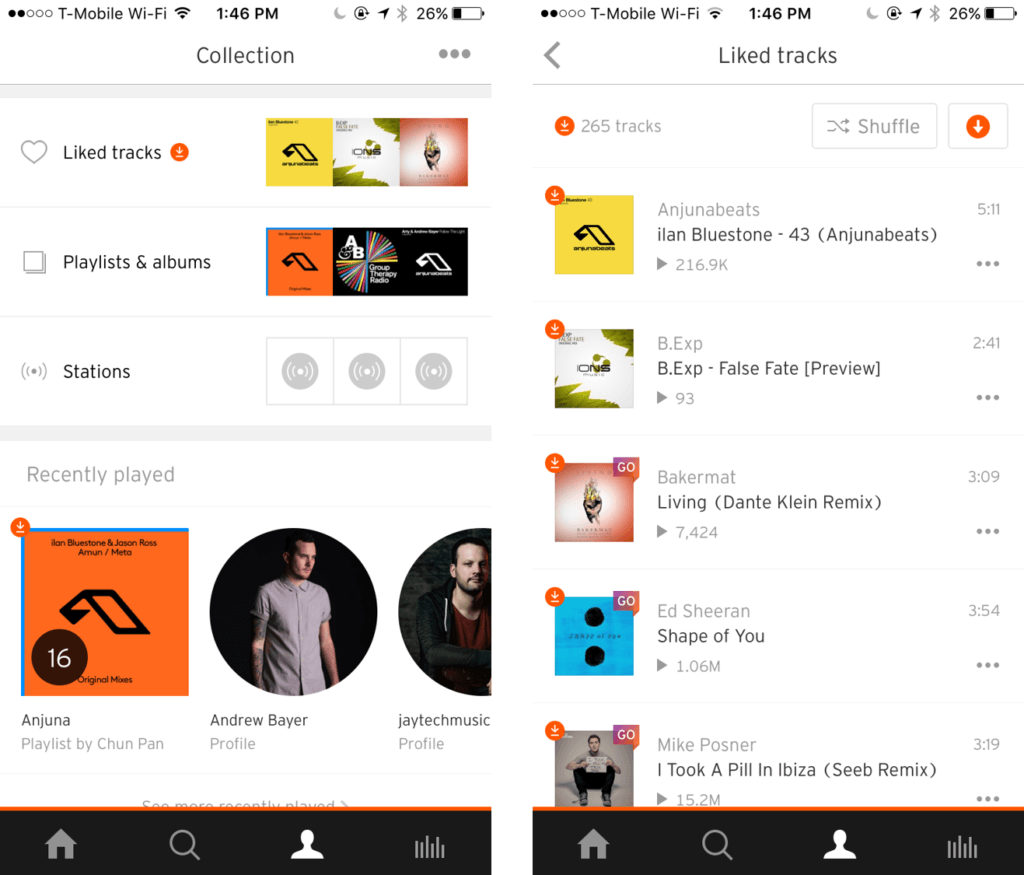SoundCloud Tunes Up the Music Ecosystem

This post explores how SoundCloud built a successful digital music platform.
SoundCloud is a digital music distribution platform with strong social hooks that launched in 2008. Initially meant for artist-to-artist collaboration, the platform blew up because of its sharing and collaboration.
Co-founders Ljung and Wahlforss on SoundCloud conception: “we both came from backgrounds connected to music, and it was just really, really annoying for us to collaborate with people on music—I mean simple collaboration, just sending tracks to other people in a private setting, getting some feedback from them, and having a conversation about that piece of music. In the same way that we’d be using Flickr for our photos, and Vimeo for our videos, we didn’t have that kind of platform for our music.” [1]
User Growth Above All
SoundCloud has shown the hockey stick growth every VC drools over. In December 2012 the platform had already reached 180 million people per month (equivalent to 8% of global Internet users) and users were uploading 10 hours of content every minute. [2] User proliferation was driven by its social, viral, and personalization features.
- Each song has a distinctive URL, which allows every file to be easily embedded anywhere: Twitter, Facebook, etc. This allows musicians to better reach and engage with their audience, and users to easily share via digital WoM so that users and their friends can continue the conversation around music on SoundCloud.
- Users can comment on any part of a track, encouraging social interaction / more fulfilling music experience:

See yellow highlighted area – users can have conversations about track - Users can create playlists, and to engage with other users via “Like,” “Repost,” “Share,” and “Follow” another user:

Show off your great music taste to followers in Stream – similar to FB News Feed – and enable others to discover new music
- SoundCloud took all your user data to provide personalized recommendations:

Personalized recommendations based your data. Discovery is core to SoundCloud
All of the above was free…until it wasn’t. SoundCloud subscribed to the camp of “grow user base first, then monetize” strategy. Alas, all good things come to an end, and SoundCloud’s free listening model is no exception. Like YouTube, SoundCloud began embedding advertising and other monetization tactics in 2014, once they had reached massive user scale.
- Monetization phase 1: advertising-supported
In August 2014, SoundCloud introduced ads, which played after every few songs. When ads first launched I had heard and seen an ad every 2-3 songs at times. It was very disruptive and annoying but I may have been in the unlucky “frequent ad” cohort experiment.
SoundCloud also launched an “On SoundCloud” partner program that allowed premier partners to monetize their content through advertising units, including pre-roll audio ads, sponsorship of channels, mobile display ads, and native content. [3]
- Monetization phase 2: subscriptions
In March 2016, the company introduced subscriptions with value added services for both users and artists:
SoundCloud Go: users pay a monthly fee for ad-free listening and access to premium copyrighted content from major record labels (Chainsmokers and the like…).
SoundCloud Pro: artists pay a monthly fee to upload up to six hours of audio, as well as access enhanced analytics, gain ability to disable comments on tracks, and other value added services. For a even higher fee, musicians can upload unlimited amount of audio – I’ve seen record labels typically go this route. [4]
SoundCloud’s transition to making money was painful for users (myself included) who were used to non-interrupted play at no cost. Yet, I stayed on the platform. What enabled SoundCloud to keep its users despite introducing pesky monetization tactics are the social and customization features mentioned above. Users accrue benefits the more they engage – in the form of social cred and personalized tracklists – and mounting losses if user leaves the product because they’ve spent a ton of time on building their profiles [5].
Personal anecdote: though Spotify and Apple Music both offer $10 / month subscriptions, I have been suckered into paying $12.99 / month for Go on iOS (though I just learned you can subscribe directly on desktop for $9.99…) because I’ve created so many playlists and saved 200+ favorite tracks on SoundCloud. I don’t have time or effort to rebuild on a different platform.

All the songs I’ve liked and playlists I’ve created. Not going to go elsewhere and do this again…
Hence, cost of multi-homing for users is high. Artists, however, tend to multi-home since cost is low and the music platform market hasn’t tipped yet. Musicians distribute via many platforms to reach as large of an audience as possible.
Dealing with Complementors
The platform got away with users uploading copyrighted content initially. However, as SoundCloud gained momentum, major music labels took notice. SoundCloud began negotiating with labels January of 2014 and raised another round, likely in anticipation of having to pay significant royalties.
Record labels would be smart to not negotiate too aggressively so that SoundCloud can sustain as a platform, since the more distribution players, the more power labels have in negotiating licensing deals to command higher royalties, better terms, etc. Labels were lucky that Spotify’s acquisition conversations with SoundCloud in late 2016 fell through.
One way SoundCloud has aligned itself with complementers is through ownership. SoundCloud reached an agreement with Warner Bros whereby Warner Bros will pay to acquire a 3-5% stake in the company in exchange for SoundCloud will pay royalties to Warner Bros, creating value for both SoundCloud and its partner. [6] SoundCloud has subsequently closed similar deals with other major labels.
SoundCloud has executed a brilliant platform strategy for growth. The verdict is still out on monetization, but it looks positive. I’m really rooting for the company as it would really be a pain to start all over and build my digital music presence from scratch…
Check out my “relax” playlist:
SoundCloud has raised $193M at $700M valuation from Union Square Ventures, Index Ventures, KPCB, The Chernin Group, Twitter Ventures, and other top names. It shopped itself for $1Bn in late 2016. [7]
[1] https://www.wired.com/2009/07/soundcloud-threatens-myspace-as-music-destination-for-twitter-era/
[2] http://thenextweb.com/insider/2012/12/04/with-10-hours-of-audio-uploaded-every-minute-soundcloud-rolls-its-new-site-design-out-to-all-users/
[3] https://thenextweb.com/insider/2013/03/11/soundcloud/#.tnw_5adIbFc3
[4] https://en.wikipedia.org/wiki/SoundCloud#SoundCloud_Pro
[5] https://news.greylock.com/the-hierarchy-of-engagement-5803bf4e6cfa#.rta6oa5fi
[6] https://www.nytimes.com/2014/11/05/business/media/soundcloud-signs-licensing-deal-with-warner-music.html?_r=0
[7] https://www.crunchbase.com/organization/soundcloud#/entity



Hi Chun, it was very interesting to read your take on this – I’m a loyal Soundcloud user myself and am watching with interest how their monetization plans unfold. I agree with you that the cost of multi-homing across streaming sites is very high for consumers these days. I’m not willing to pay a subscription for more than one service and I am not willing to give up the service that has all my playlists. However, it feels like this is not the right way to retain users in the long run. I have already been looking for ways to download my playlists (at least the track names) so I have them saved somewhere for future reference. The most powerful differentiating aspect of SC vs. other music platforms, still seems the ability to share and discover novel content, and they need to make sure that this is not lost in an attempt to introduce a subscription model.
Totally agree. The discovery / sharing element weakens if majority of users (who don’t pay) consuming Stream sees a bunch of content locked behind Go. But I speculate this is an issue for SoundCloud’s peers – Go-only tracks are owned by large labels and the labels are probably demanding similar treatment on Spotify and other platforms. As long as SoundCloud is on parity with other platforms on free vs paid content, it can keep users on with its strong retention features.
I am a big fan of soundcloud and when I used to be in a band would post our music on there as well. How do you see soundcloud playing in the realm of larger music streaming incumbents like Apple Music and Spotify that you mentioned? If Spotify was also to allow users and musicians to upload their own music in a similar sharing interface – how would Soundcloud be able to respond / maintain a competitive advantage?
Apple Music and Spotify only allow vetted labels / “legitimate players” to upload music. Soundcloud lets anyone upload, so it could differentiate by being more of a niche player with indie / up and coming bands or a collaboration tool for musicians (Google Docs for musicians), which is the model they originally started out with.